The best electric cargo bikes provide ample carrying space with motor assistance, helping you transport heavy loads with ease.
Almost every area of the bicycle market has been electrified. The best electric bikes encompass the full range of bicycle styles.
Cargo bikes are no exception. Electric bike motors make these load-lugging bicycles much easier to pedal.
Here, we bring together the best electric cargo bikes tested by the BikeRadar team.
You can skip to our e-cargo ebike buyer's guide, which covers everything you need to know about cargo ebikes: what they are, how they work, what they’re useful for, and their advantages and disadvantages.
Best electric cargo bikes
Tern Quick Haul P9
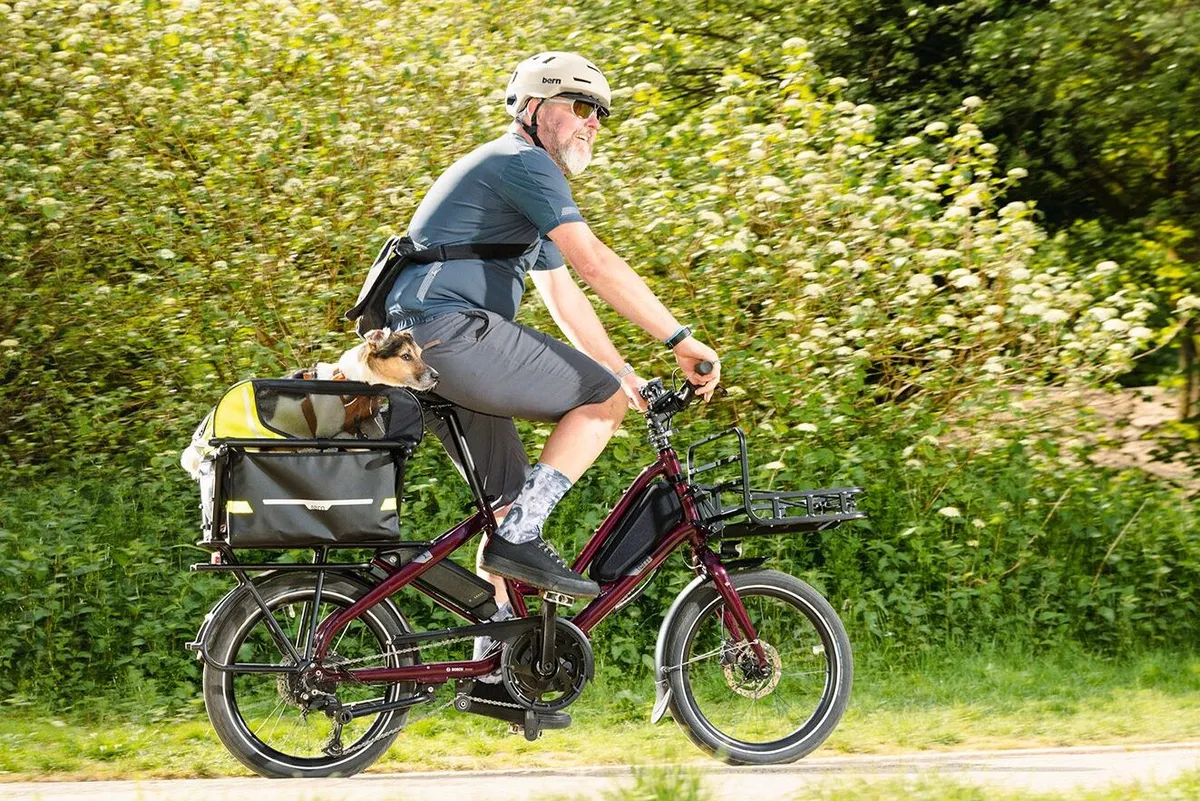
- £3,100 / $3,299 / AU$4,995 as tested
- Pros: Compact frame can be stored on its end; fun to ride
- Cons: Add-ons can bump up price
The Tern Quick Haul P9 provides extra carrying capacity of up to 70kg in a small-wheeled, compact package. It's suitable for a wide range of rider heights, with both the seatpost and the bar height easy to adjust, and can be stored standing on its rear rack to save space.
The Quick Haul is powered by a Bosch Performance Line motor with an external 400Wh battery that gives extensive range – we got 46 miles from a charge.
The bike handles and rides really nicely, thanks to the low-positioned motor and battery, and wide Schwalbe tyres. You can pick from a broad range of accessories to tailor the Quick Haul to your load-lugging needs.
Momentum PakYak E+
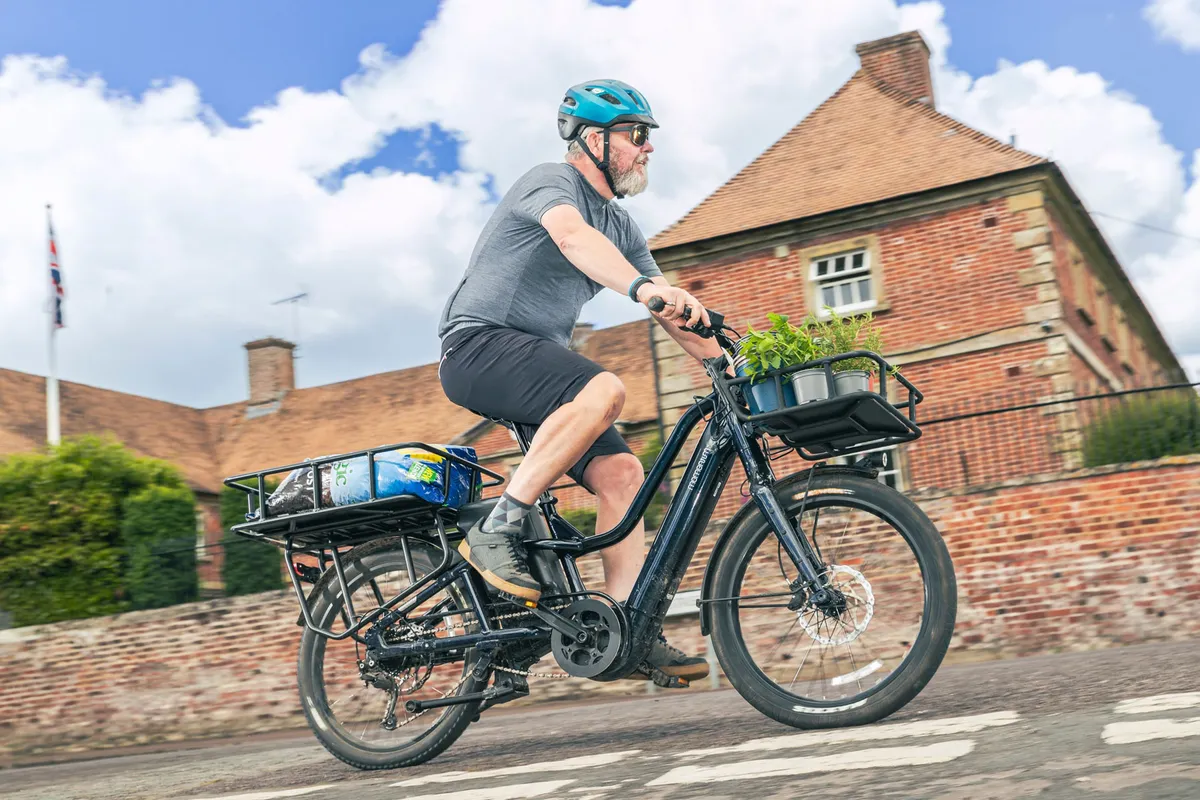
- £4,149 as tested
- Pros: Brilliant handling; good range; extra kit included; decent value
- Cons: Unstable kickstand
The Momentum PakYak E+ handles fantastically when correctly configured and puts you in an ideal riding position.
A mid-mount Yamaha motor has plenty of oomph, while the 500Wh battery provides stacks of range.
Momentum also includes quality equipment, such as a rack, lights and mudguards. The ability to adjust the speed of the steering is nice to have.
At £4,148.99, the PakYak E+ seems a viable alternative to a small car and more competitively priced than other e-cargo bikes.
Cannondale Cargowagen Neo 1

- £5,390 as tested
- Pros: Brilliant drivetrain and motor; generous spec; comfortable and steady ride
- Cons: Limited manoeuvrability
The Cannondale Cargowagen Neo 1 is a slick-riding electric cargo bike packed with features and versatility.
Despite being relatively compact, the Cargowagen Neo 1 has ample power, range and capacity to render your small car redundant.
Even when laden, handling is assured. The dropper post facilitates stopping and starting.
Steering stops make the Cargowagen Neo 1 tricky to turn in a small circle. But this issue doesn’t remove much gloss from this quality cargo ebike.
Cube Longtail Sport Hybrid 725
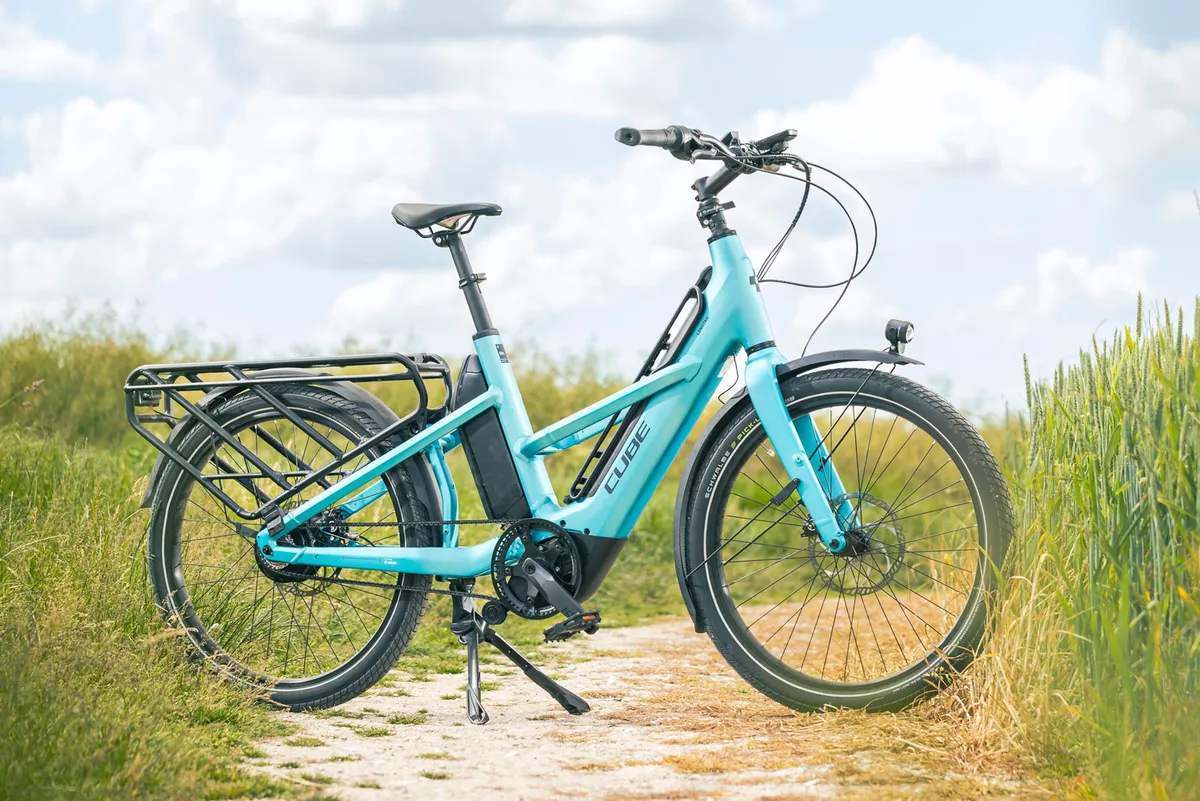
- £3,999 / €4,699 as tested
- Pros: Long range; impressive spec; lively handling
- Cons: Shorter riders will need a dropper post
The Cube Longtail Sport Hybrid 725 has large wheels and a big capacity, and is comfortable and playful to ride.
Assisted by the powerful Bosch Cargo Line motor and capable of carrying two batteries to increase range, the Longtail Sport Hybrid 725 can step in for your car most of the time.
Cube specs a lot of good kit as standard, including a long rear rack, mudguards, integrated lights and a kickstand.
Although the Longtail Sport Hybrid 725 fits riders of different heights, a dropper post would help shorter cyclists feel more confident.
Mycle Cargo
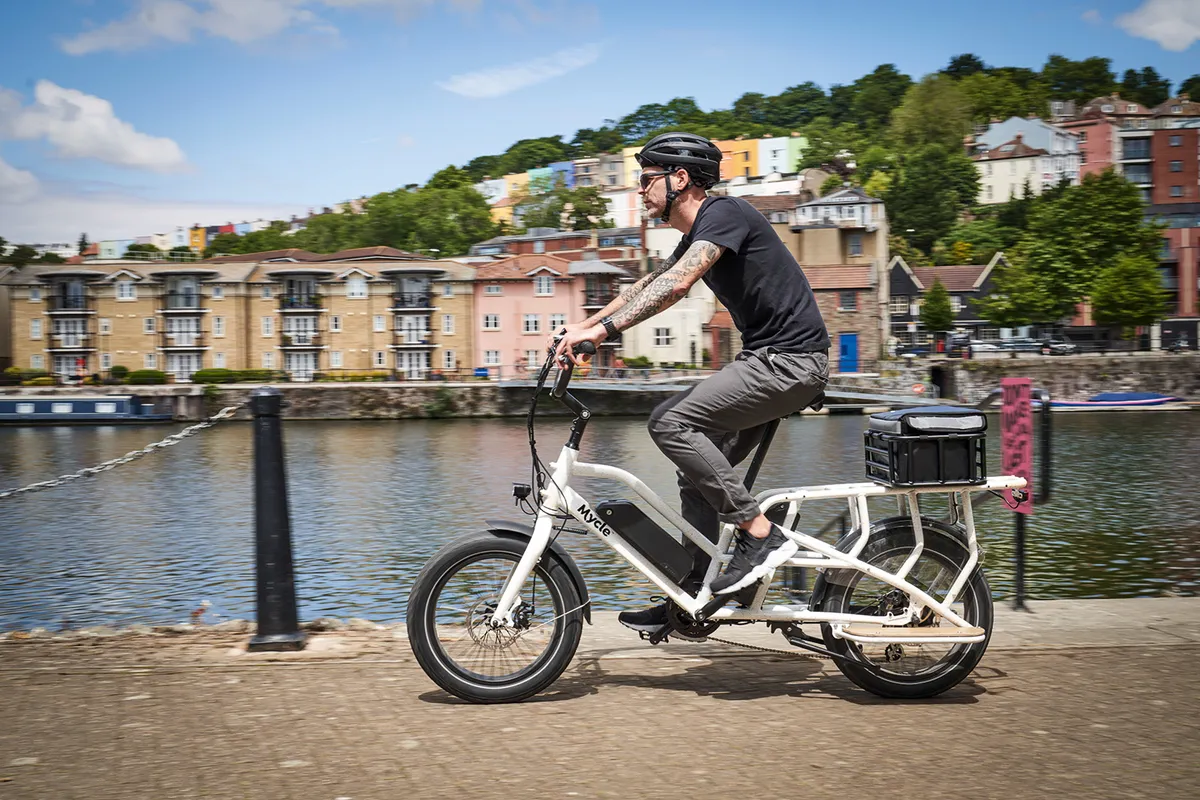
- £1,900 as tested
- Pros: Well equipped; inexpensive for a cargo bike; huge load-carrying and battery capacity
- Cons: Lag in power delivery
The Mycle Cargo gives you a lot of carrying capacity and good range for not too much cash. It's rated for loads up to 215kg, which the long tail gives you the space to carry. You can easily fit two adults or two child seats and the Mycle comes with seat pads for the rear rack.
There's plenty of torque from the 65Nm motor, although power delivery is slightly quirky with a lag after starting, before the motor kicks in. You can add a second battery, as we did, to extend the capacity to 720Wh and the range to a claimed 120km.
The Mycle Cargo is very easy to ride and well equipped, with a wide-range 7-speed drivetrain and effective Tektro mechanical disc brakes. It's supplied ready-fitted with lights too.
Rad Power RadRunner 3 Plus
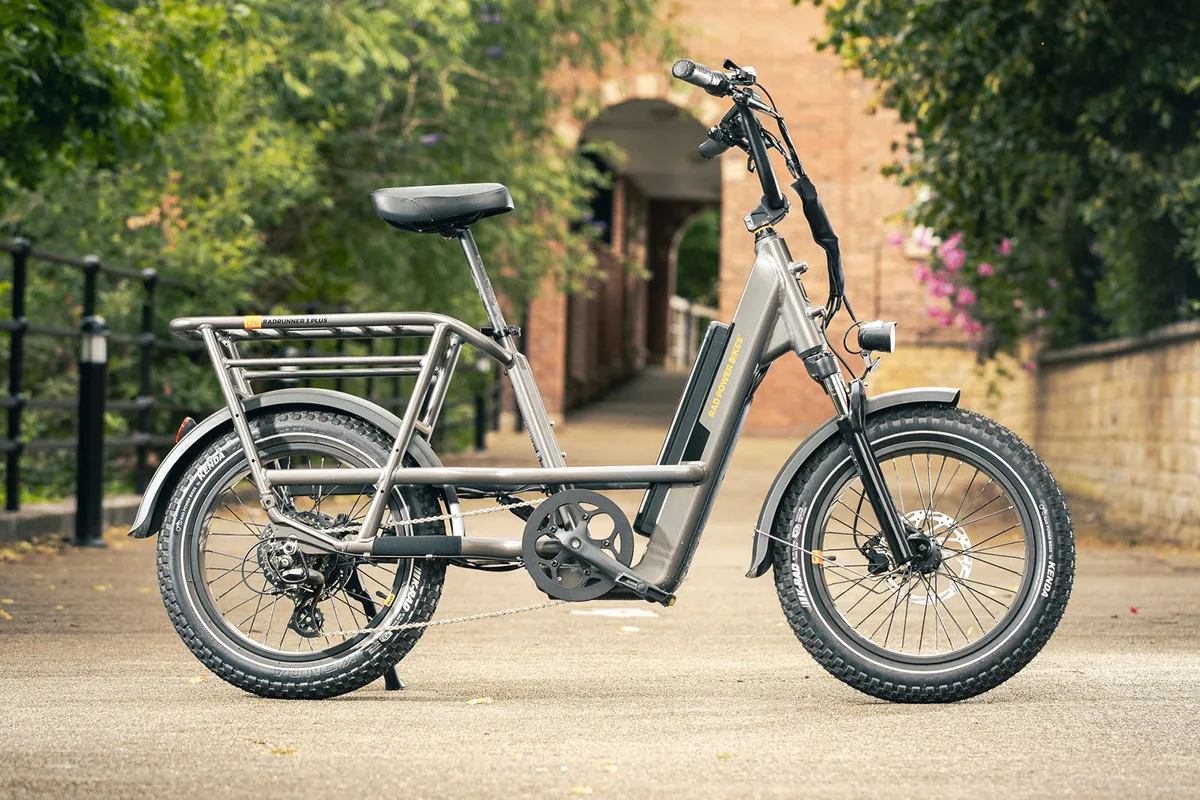
- £2,199 / $2,299 as tested
- Pros: Easy to ride; large load capacity; well put together
- Cons: Not good on big hills
The Rad Power RadRunner 3 Plus is a small-wheeled utility bike with a big load capacity, offering a smart and cost-effective way of getting around.
Rad Power has a reputation for making well-priced ebikes, and the RadRunner 3 Plus is no exception. The smartly designed frame has a super-low step-through, lots of fixtures to add accessories and it's very well finished.
The ebike comes with a suspension fork, lights, alloy mudguards and hydraulic disc brakes to bring the 34.2kg bike to a stop.
The 250-watt rear hub motor and 672Wh battery work well in most conditions, but not on steep inclines.
Ridgeback Errand
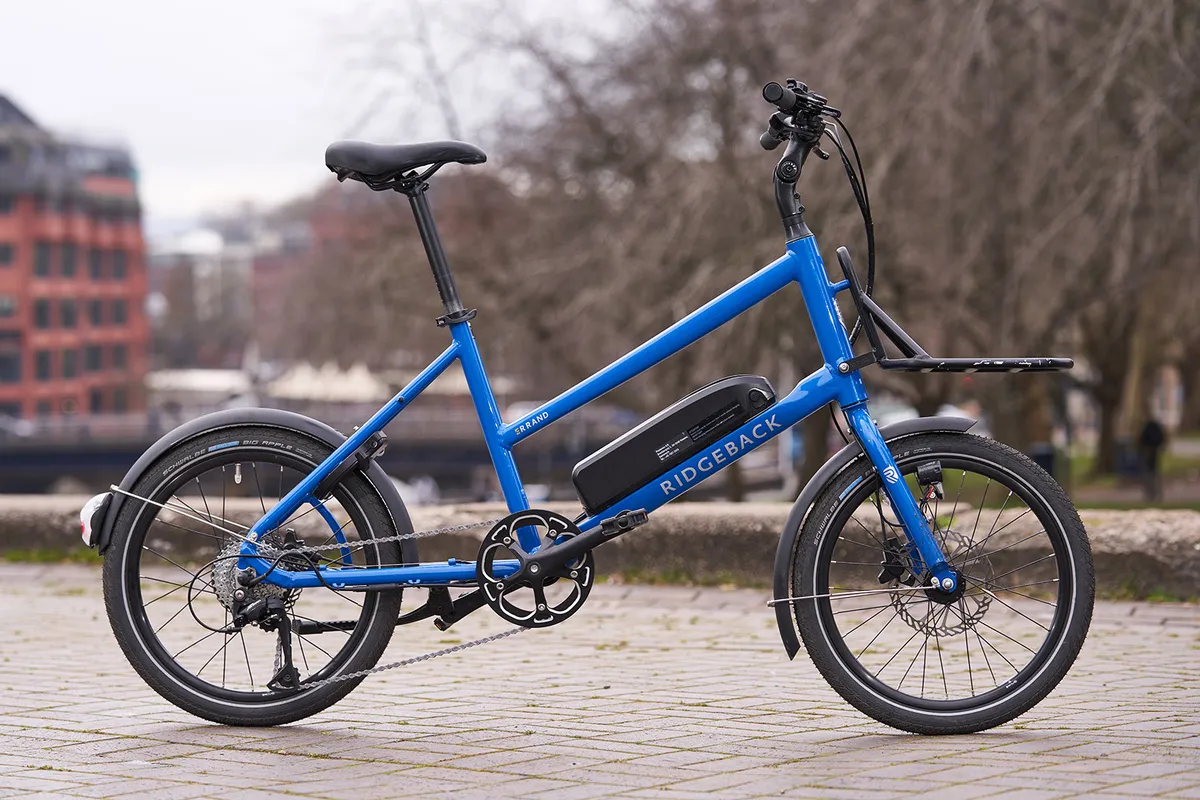
- £1,800 as tested
- Pros: Comfortable ride with plenty of power and range; equipped with lights, mudguards and a frame lock
- Cons: Squishy saddle; no rear rack
The Ridgeback Errand is a lighter, more nimble take on the electric cargo bike, with a front rack for your load. It's highly adjustable to suit a range of rider heights and comes equipped with mudguards, lights, a kickstand and a frame lock.
The Errand is powered by a compact Danish rear-hub motor with 54Nm torque. However, it feels more powerful than this, with a removable 316.8Wh battery that gave us 35 miles of range.
The bike has 650b wheels, which make for easy low-speed handling, while the long wheelbase adds stability. It's equipped with Clarks hydraulic disc brakes that provided plenty of stopping power during our testing. We just missed having a rear rack for extra load-carrying capacity.
Tern Orox R14
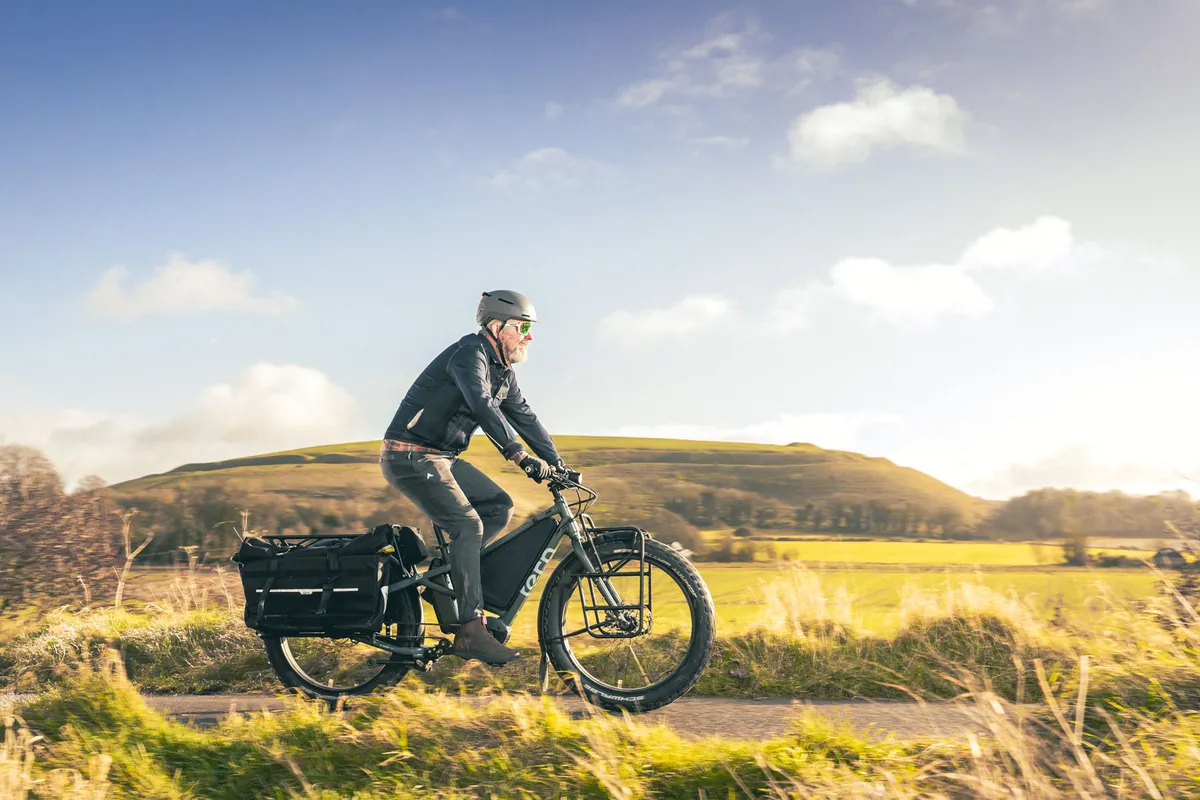
- £8,100 as tested
- Pros: Off-road capability; entertaining and comfortable; gigantic range
- Cons: wheels are tricky to remove; hard to store; shifting issues
The Tern Orox R14 rides like an agile tractor off-road and proves very comfortable on tarmac.
Thanks to its powerful Bosch Performance CX motor, the Orox R14 can haul a huge load a long way.
However, removing a wheel on the 33kg Orox R14 is a two-person job and you'll need a lot of space to store it.
The Rohloff drivetrain on the bike we tested is a little complicated and expensive. Our tester would recommend the cheaper Shimano XT build.
Also consider…
These electric cargo bikes didn't score four stars or above in our reviews, but they are worth considering if you're looking to buy the best electric cargo bike for your needs.
Benno Bikes RemiDemi 9D
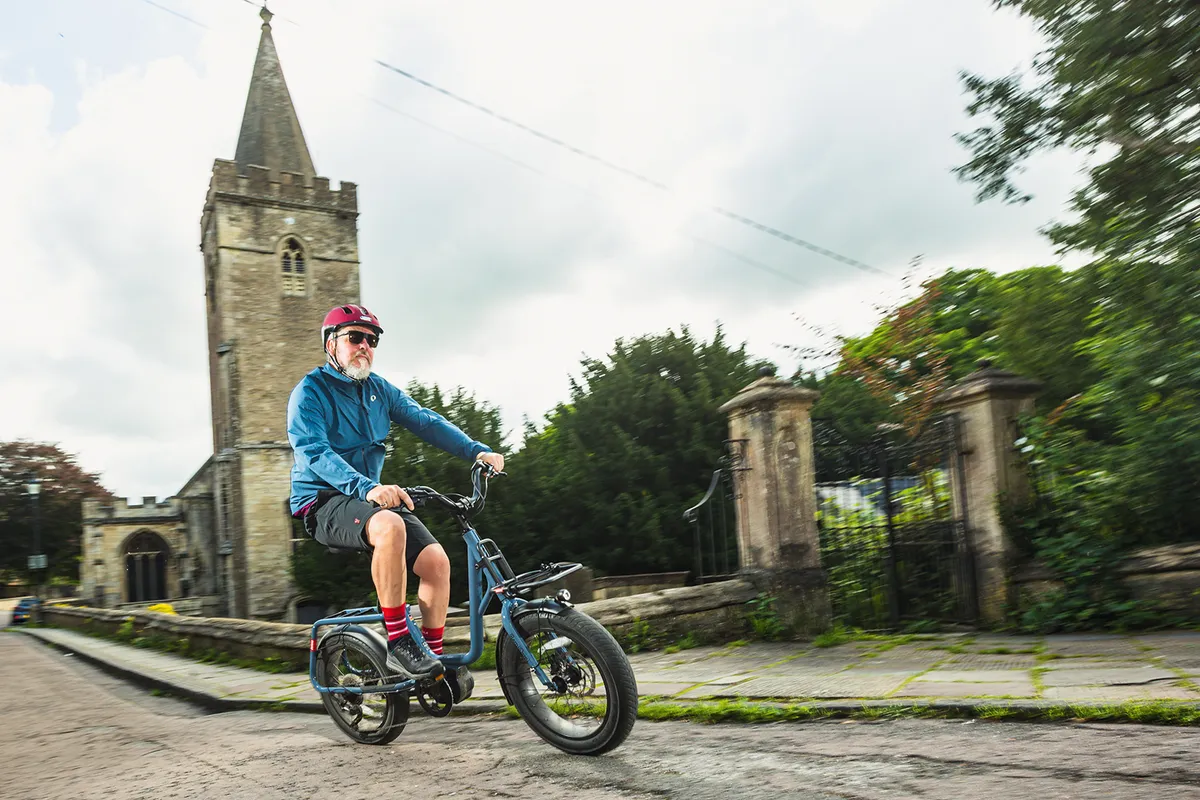
- £3,400 as tested
- Pros: 50kg load capacity; fun and fast ride
- Cons: Single-sided kickstand; heavy
Benno Bikes specialises in electric cargo bikes, with the RemiDemi its compact option sporting a 1.13m wheelbase, making it manoeuvrable on city streets. The grippy, extra-wide tyres make it a lot of fun to ride as well.
There's cargo capacity of 20kg at the front and another 30kg at the back, making this a practical load lugger. You can fit a wide range of accessories, including a Thule child seat and even a surfboard rack. Supplied accessories include mudguards and lights, and it's equipped with folding pedals.
The RemiDemi is powered by a Bosch Performance Line motor and 396Wh battery that make light work of the bike's 30kg weight. We got up to 75km range from a charge. A dual-sided kickstand is an option, but we'd have preferred to see it as standard kit to increase stability when parked up.
Trek Fetch+ 2

- £5,160 / $5,590 as tested
- Pros: Simple to ride; plenty of watts; smart controller
- Cons: Expensive; extras increase cost; requires large storage space
The Trek Fetch+ 2 is versatile, enjoyable and straightforward to ride, and easy to live with provided you have lots of room to park it.
However, relative to its motor, the battery is quite small to the detriment of range, particularly when you're loaded up.
Furthermore, kit, such as racks and mudguards, that other brands spec as standard, is sold separately. This calls the value of the £5,160 / $5,590 electric cargo bike into question.
- Read our full Trek Fetch+ 2 review
Vaast E/1 Rohloff
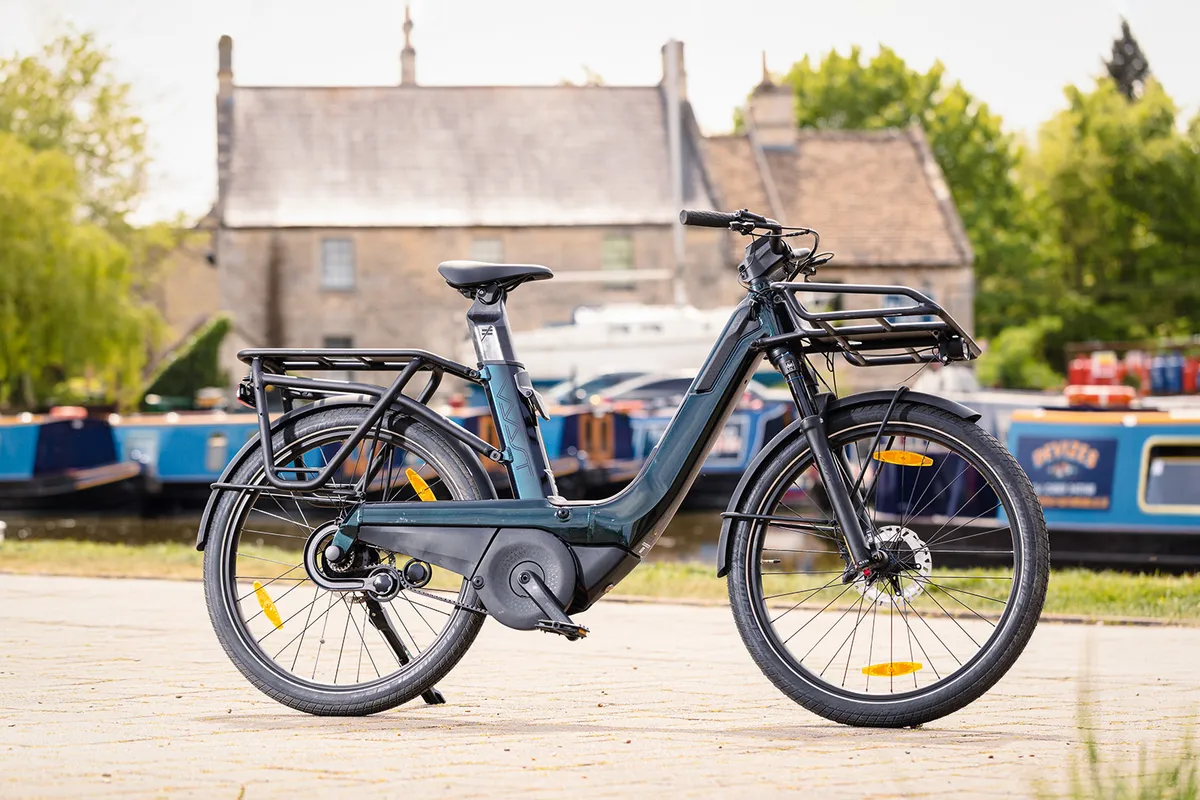
- $8,000 / €8,749 as tested
- Pros: Front and rear suspension; 14-speed electronic-shifting hub gear
- Cons: Complex; very expensive
Another electric cargo bike that splits load capacity between a front and a rear rack, the Vaast E/1 includes both front and rear suspension with 110mm and 100mm of travel respectively. It wafts over rough surfaces.
The bike comes with a powerful Bosch CX motor with 85Nm of torque. We found the 14 speeds offered by the Rohloff hub gear too many to handle though, with too low a bottom gear that meant frenetic upshifts when getting away from traffic lights.
Range is decent at 75km. At 36kg, the Vaast E/1 Rohloff is heavy, particularly when you want to move it around off-bike, and it's tricky to get the suspension tuned correctly. We reckon one of the two lower-specced models would be a better option.
Electric cargo bike buyer's guide
What is an electric cargo bike?

A cargo bike is a bike designed to carry loads. Most feature a longer wheelbase than a standard bike to increase stability, as well as a rack or hopper to place items on or in.
A cargo bike will normally have a sturdy load-carrying area or rack instead of a standard bolt-on pannier rack. This is usually built into the frame and is non-removable.
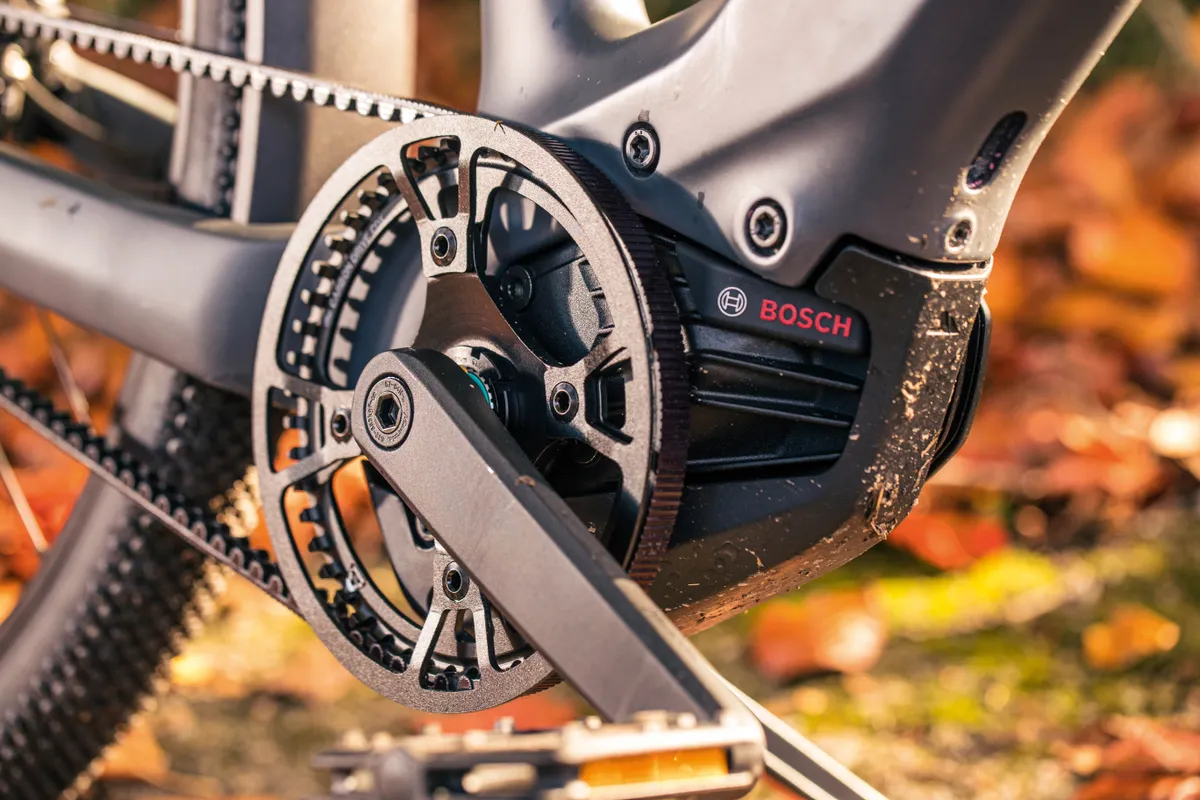
An electric cargo bike adds an electric motor and battery to a cargo bike. As with other electric bikes, this provides extra power and assistance up to a speed at which, governed by electric bike laws, the assistance has to cut out.
In most of the world, that’s 25kph/15mph, whereas in the USA it’s normally 20mph. You usually have to pedal for the motor to provide assistance, although some electric cargo bikes might be throttle operated.
Check out our electric bike basics guide for more information.
What can you use an electric cargo bike for?
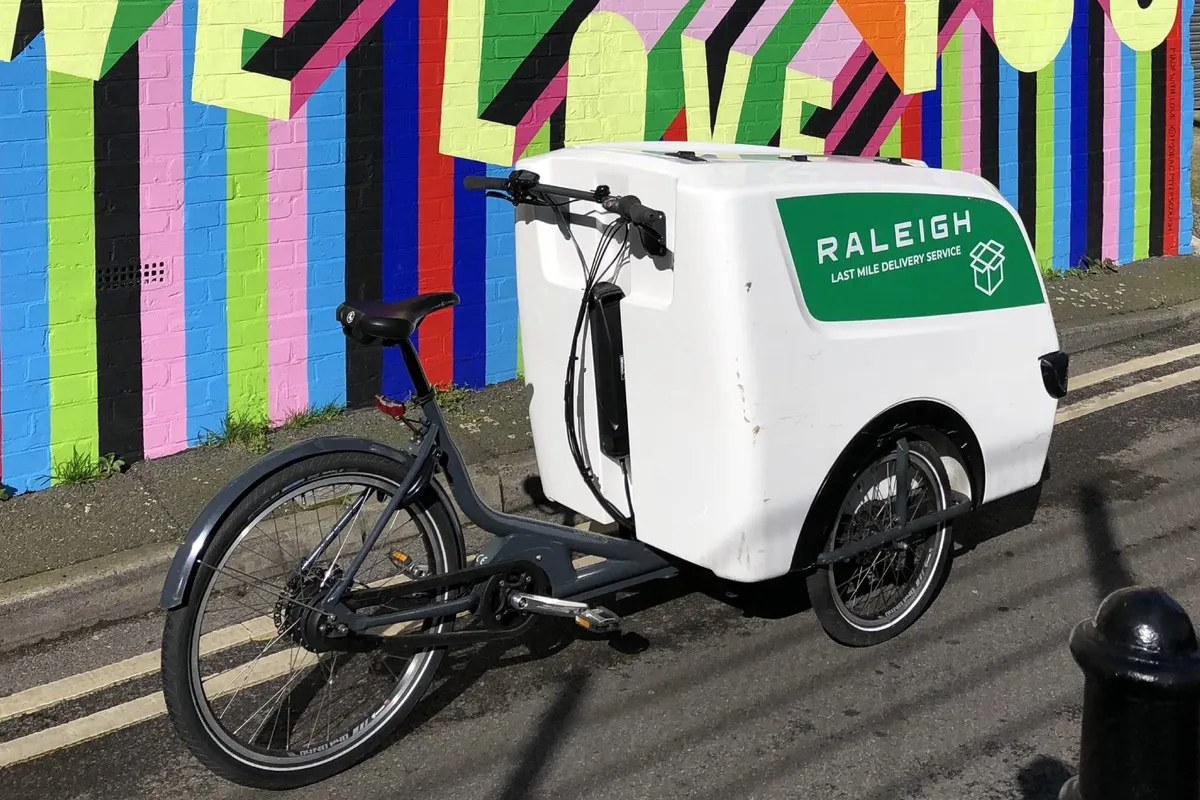
Electric cargo bikes are a really versatile option for a range of load-lugging duties.
The most obvious is carrying cargo that is too heavy or bulky for a regular bicycle.
A 2019 report from the UK Department for Transport found that around 16 per cent of all vehicle miles on UK roads were driven in vans.
It also found a 50 per cent increase in van trips made on urban roads in 10 years, with 23 per cent of total van miles being for delivery and distribution.
Load sizes are getting smaller and routing less efficient as customers demand faster delivery from services such as Amazon Prime.
For short urban deliveries, electric cargo bikes provide a viable alternative to motorised vehicles. They’re as fast as a van, non-polluting, cheaper and parking is less of an issue.
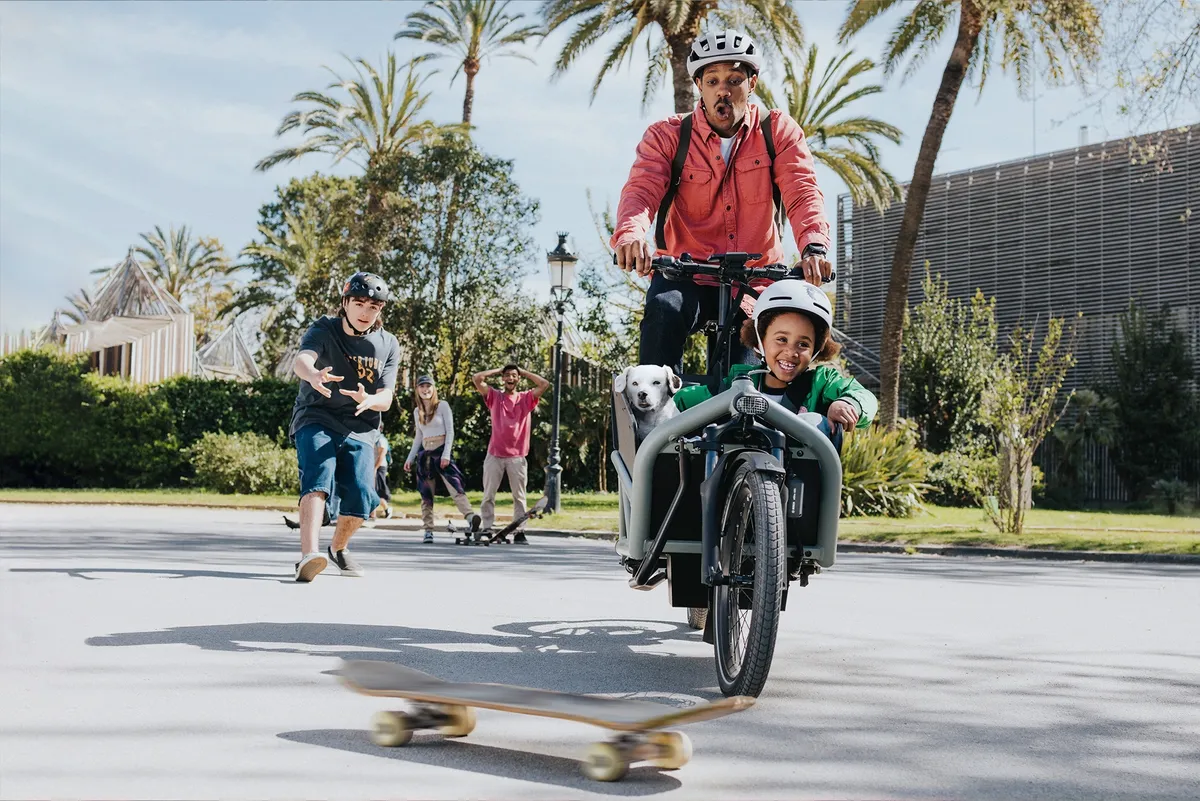
For everyday riders, electric cargo bikes also make transporting children or other passengers a practical alternative to car journeys for school runs and other trips.
Built-in seats with harnesses and rain covers make for a safe, comfortable environment.
Electric cargo bikes are also a good option for shopping, their ease of parking and navigation through crowded streets again making them a good alternative to car journeys. Camping trips and other excursions are also a possibility.
In fact, an electric cargo bike could provide a car replacement for many users.
Electric cargo bike vs non-assisted cargo bike – the pros and cons explained
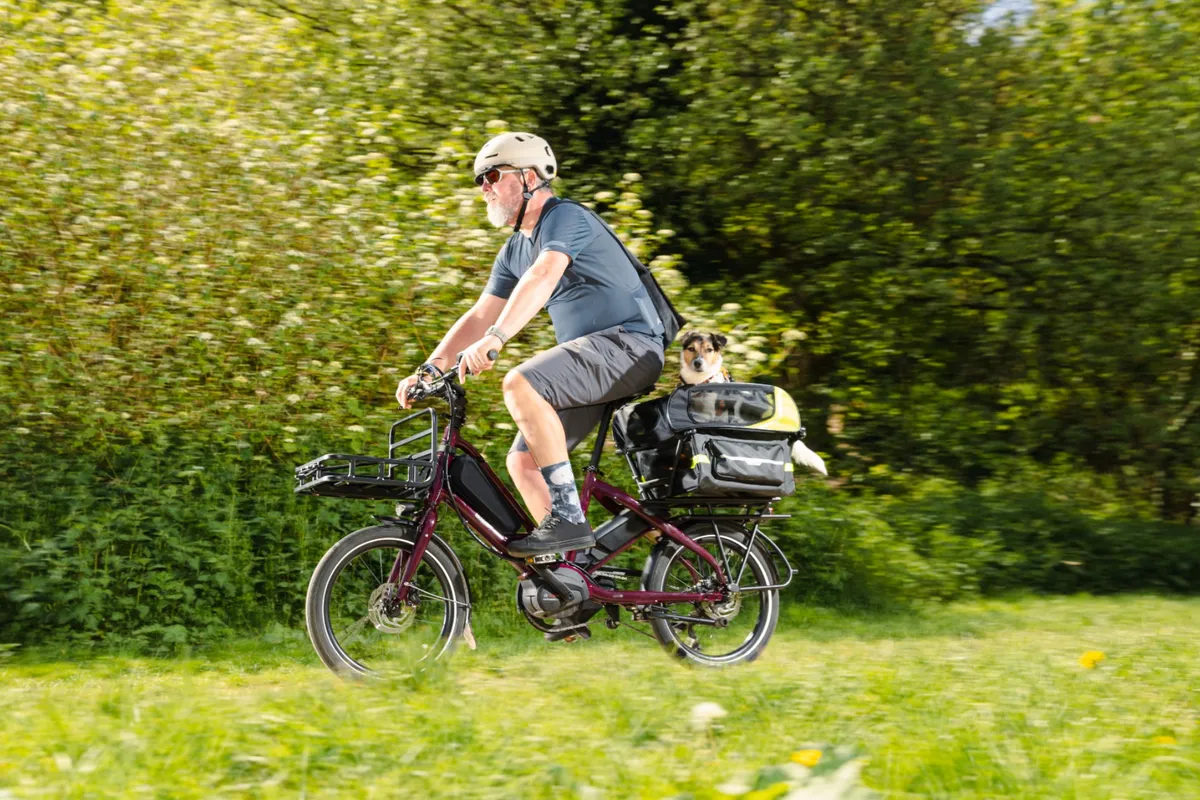
For moving larger loads around, the electric assistance of an e-cargo bike makes riding a lot easier and makes travelling longer distances a more practical option. In fact, there are many more cargo bike options available with a motor than without.
The frequent starts and stops for traffic in urban settings and on delivery runs make getting a cargo bike – whether assisted or non-assisted – moving from a standstill harder than a steady run.
Likewise, any hills you encounter on your ride will be a lot easier with electrical assistance.
But the motor and battery add yet more weight to an electric bike over a non-assisted bike.
Any cargo bike tends to be heavy, due to the extended wheelbase (which means more frame material), substantially built carry area, and chunky wheels and tyres. The frame is often made of steel too.
Even the lightest cargo bikes start off at over 20kg; 30kg is more typical, even before you add extras such as seats or a box. In contrast, a normal bike is likely to weigh well under 20kg, even if it’s built heavily.
A typical electric cargo bike motor will add just under 3kg, while you can expect even a low-capacity battery to double that. A high-capacity battery can weigh over 4kg, so a double-battery configuration could add over 11kg to the cargo bike’s weight.
Riese & Müller’s electric cargo bikes weigh around 35kg and the electric Cube Cargo Hybrid can weigh close to 50kg, for example.
Electric cargo bikes are built tough, however, and you can expect to be able to carry a load of over 200kg (including the rider) on many models. That’s a lot of mass to get moving, and the motor and battery – even with their additional weight over a non-assisted cargo bike – are definitely an asset.
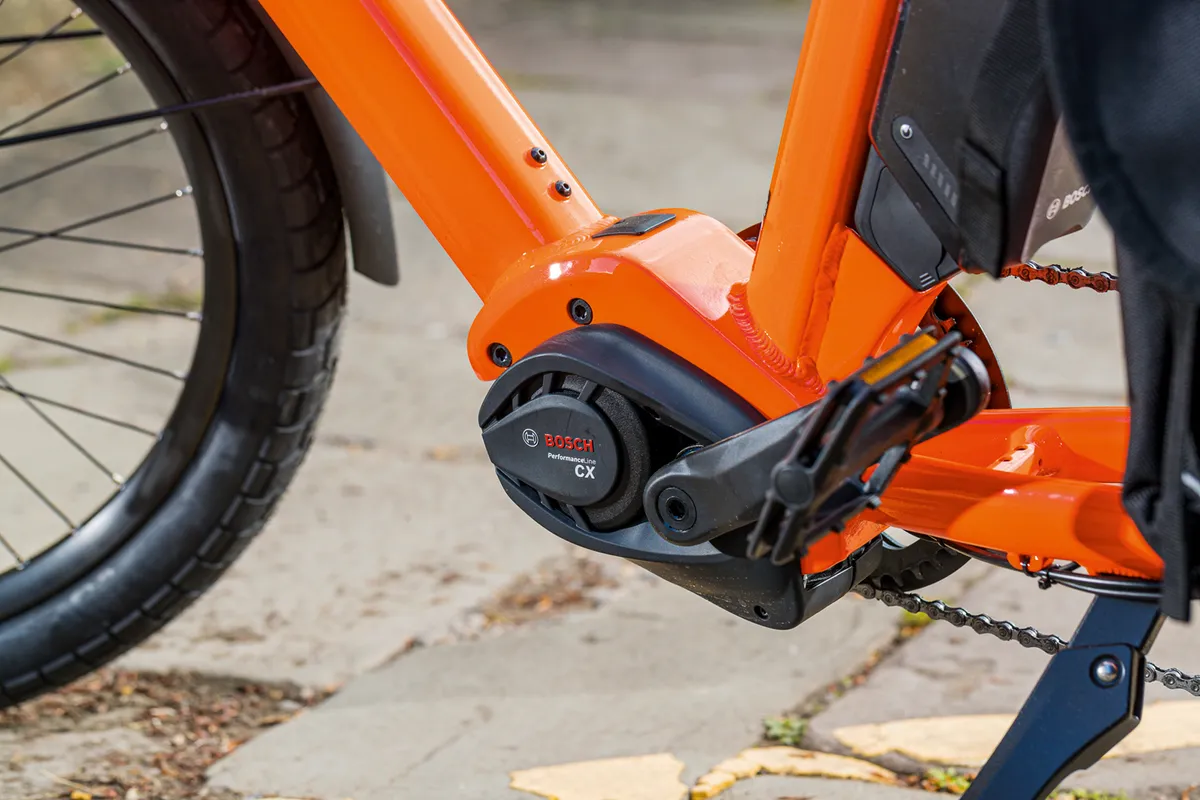
Electric bikes are also, generally speaking, quite expensive.
A quality electric bike motor system is likely to increase the price of an electric cargo bike by around £1,000 over a pedal-only cargo bike.
You can expect higher maintenance costs for an electric bike over a normal bike too, due to the extra wear on the drivetrain, the possibility of electrical issues and the impact of the extra weight on tyres, wheels and brakes.
With a heavy frame and often sporting small wheels with chunky tyres on a long wheelbase, don’t expect a fast or lively ride from a cargo bike, whether electric or not.
On the other hand, an electric cargo bike can be surprisingly agile and will enable you to zip around stationary traffic and through bike-only shortcuts to get to your destination faster.
What about battery range?
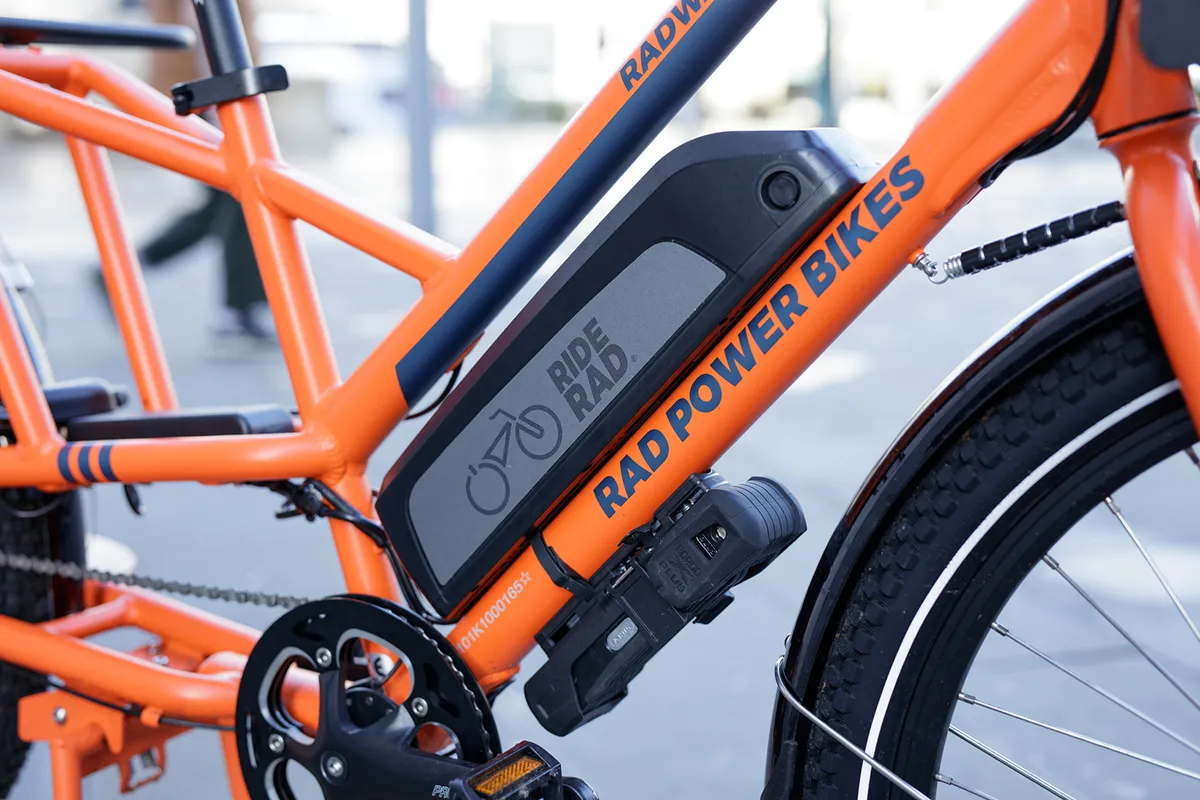
If an electric cargo bike is going to be used extensively, it’s possible the battery won’t have enough capacity to last an entire day.
This means you’ll either need to swap in a spare battery, recharge during the work day (which can take several hours), or suffer through the arduous task of pedalling without assistance.
The stop-start nature of urban riding means the battery is likely to be drained more quickly as well.
Types of electric cargo bike
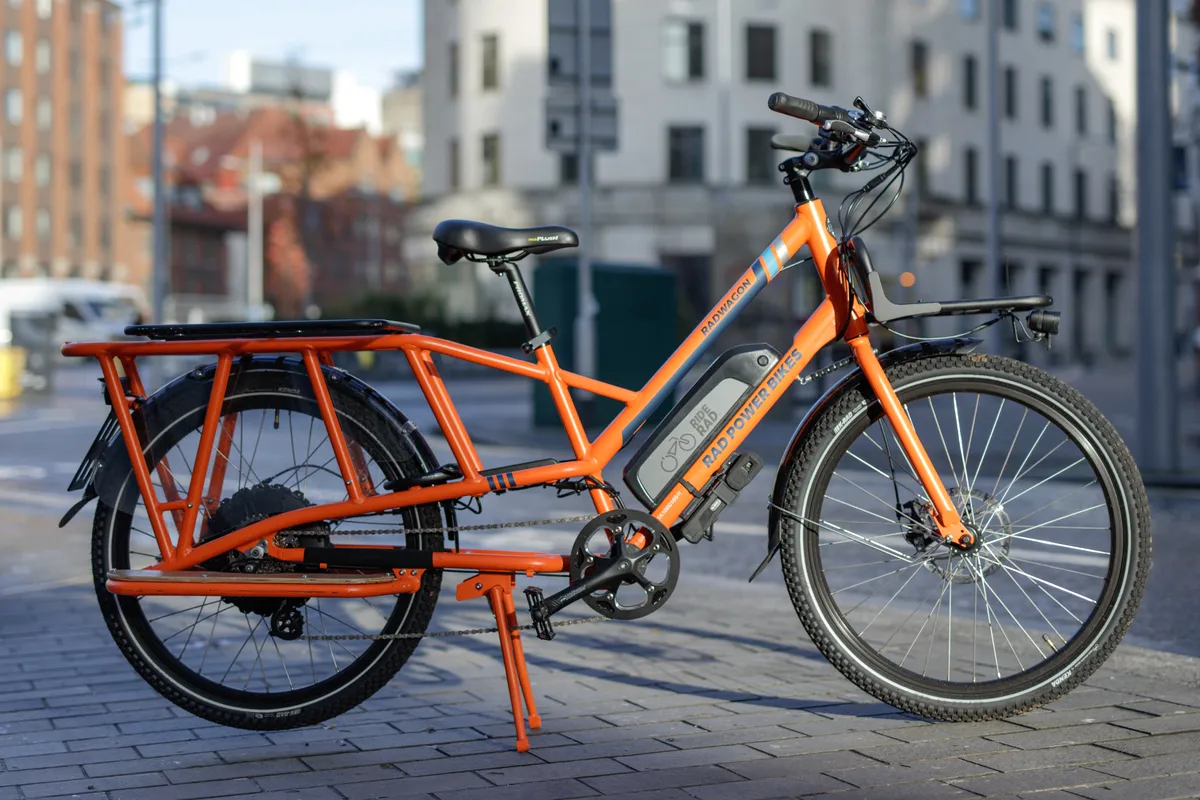
Electric cargo bikes typically have an extended wheelbase over a conventional bike. That allows the inclusion of a cargo-carrying area either fore or aft of the rider.
Often, cargo bikes will have smaller wheels than a standard bike, or different-sized wheels front and rear, so the load can be carried lower on the frame and the centre of gravity of the bike is lower.
Both of these design features improve handling compared to strapping a load to a conventional bike.
Many cargo bikes enable you to add different load carriers to suit different uses.
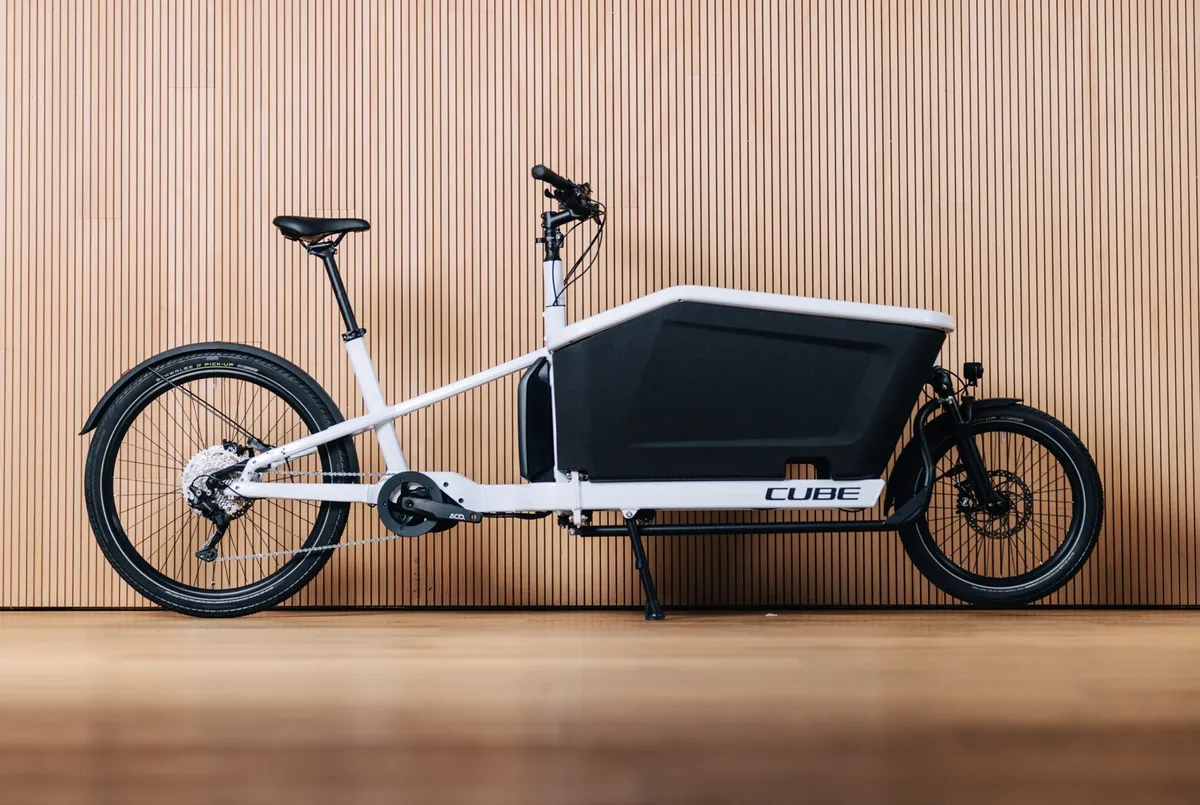
Cube’s Cargo Hybrid, for example, enables you to fit seats inside its front hopper so you can carry children. The Mycle Cargo comes with footrests and removable pads for its rear rack, so you can carry passengers. You can also fit child seats to it.
Cargo bikes with a built-in box often go by the Dutch name bakfiets (which translates as 'box bike'). It’s a popular way to carry goods and luggage, but also enables you to fit seats for children for the school run and other excursions. Bakfiets is a brand name for a Dutch maker of cargo bikes as well.
Other electric cargo bike designs, such as the Surly Skid Loader, include a beefed-up front and/or rear rack on a more conventional, shorter-wheelbase bike frame.
That has the advantage of manoeuvrability, but may limit how much you can carry. They’re generally less stable too, because a poorly distributed rear load may tend to shift the bike’s centre of mass behind the rear-wheel axis and a large front-end load can affect steering.
Electric cargo tricycles
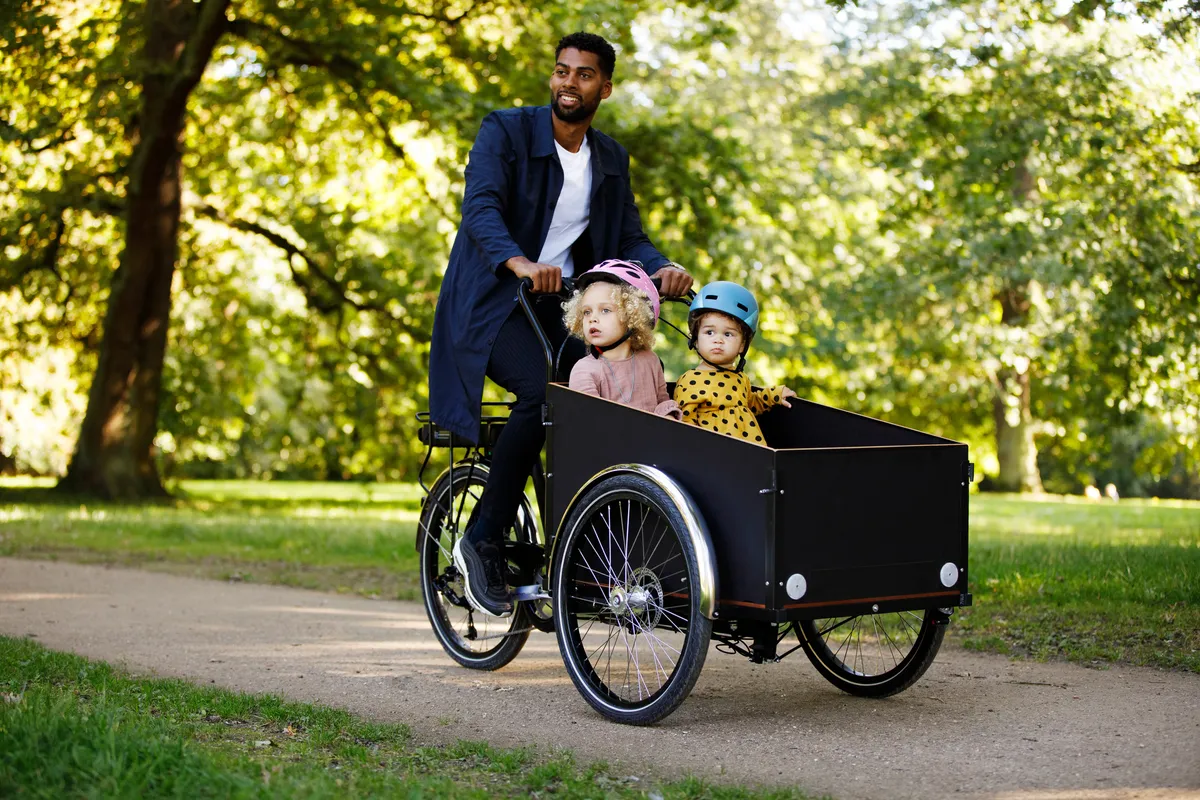
Not all electric cargo bikes are technically bikes, because tricycles are available as well.
The configuration usually includes two wheels at the front, as with the Raleigh Pro Electric Cargo Trike. This enables the fitment of a large front container for goods or passengers (this is sometimes referred to as a ‘tadpole’ trike).
An advantage is that stability isn’t a problem and it’s easier to park because you don’t need a kickstand.
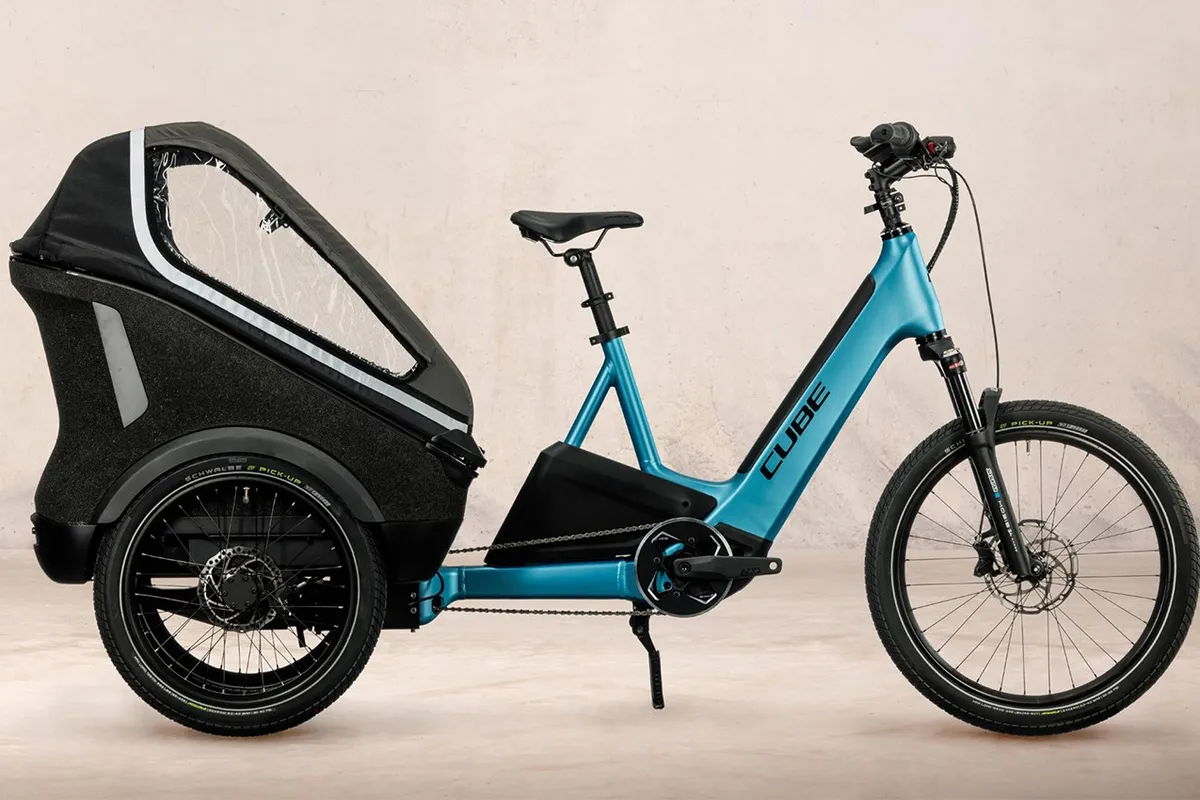
Cube’s Trike Concept electric cargo bike has double wheels at the rear and a mid-frame pivot so you can lean into corners. Cube says having the load at the rear and a conventional-looking front means it’s easier to steer and see where you’re going.
In some cases, such as the Tern Quick Haul, you can hitch up a trailer for even more carrying capacity.
Electric cargo bike motors
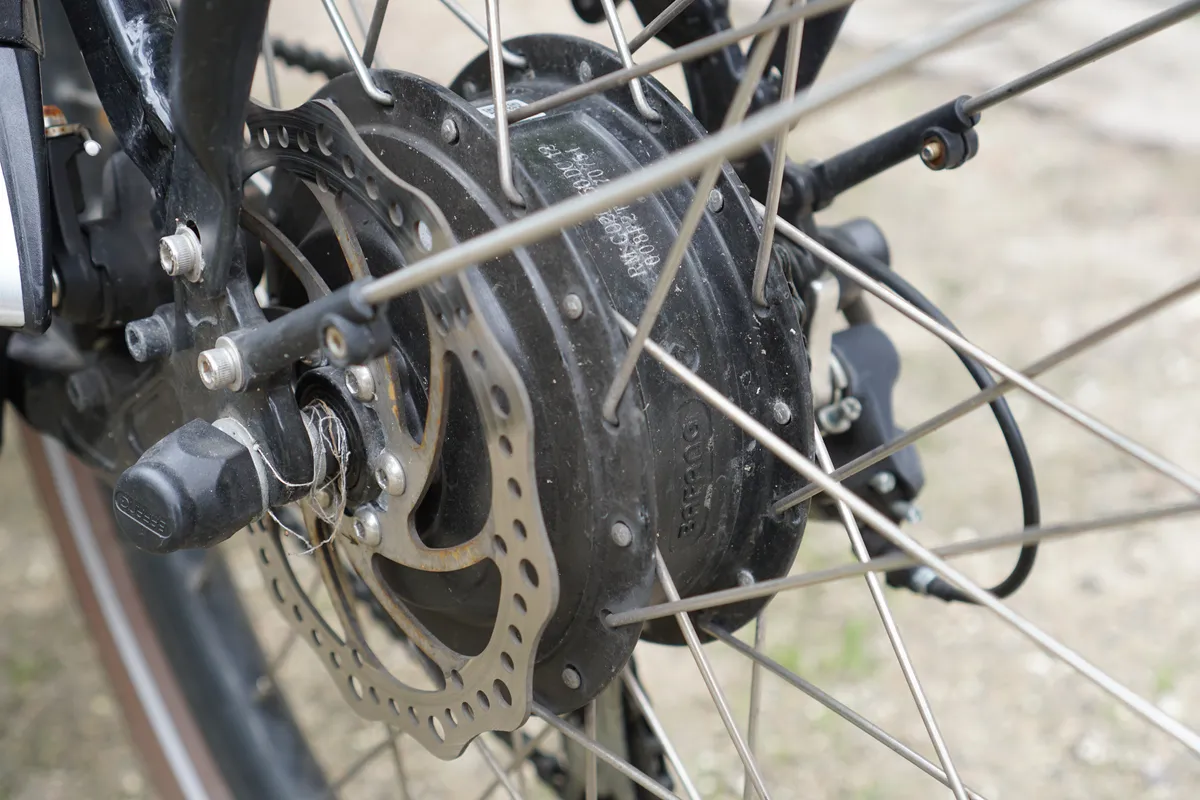
Most electric cargo bikes have their motors mounted in the bottom bracket, where it’s central and can provide power to the rear wheel through the cargo bike’s drivetrain.
Other electric cargo bikes may have a rear-hub motor – the Mycle Cargo is an example.
Recognising the potential of the electric cargo bike market, both Shimano Steps and Bosch, brand leaders in electric bike motors, have released cargo-specific versions of their electric bike drive systems.
These have high torque output and a power delivery curve that’s geared to getting the extra weight of a loaded electric cargo bike moving.
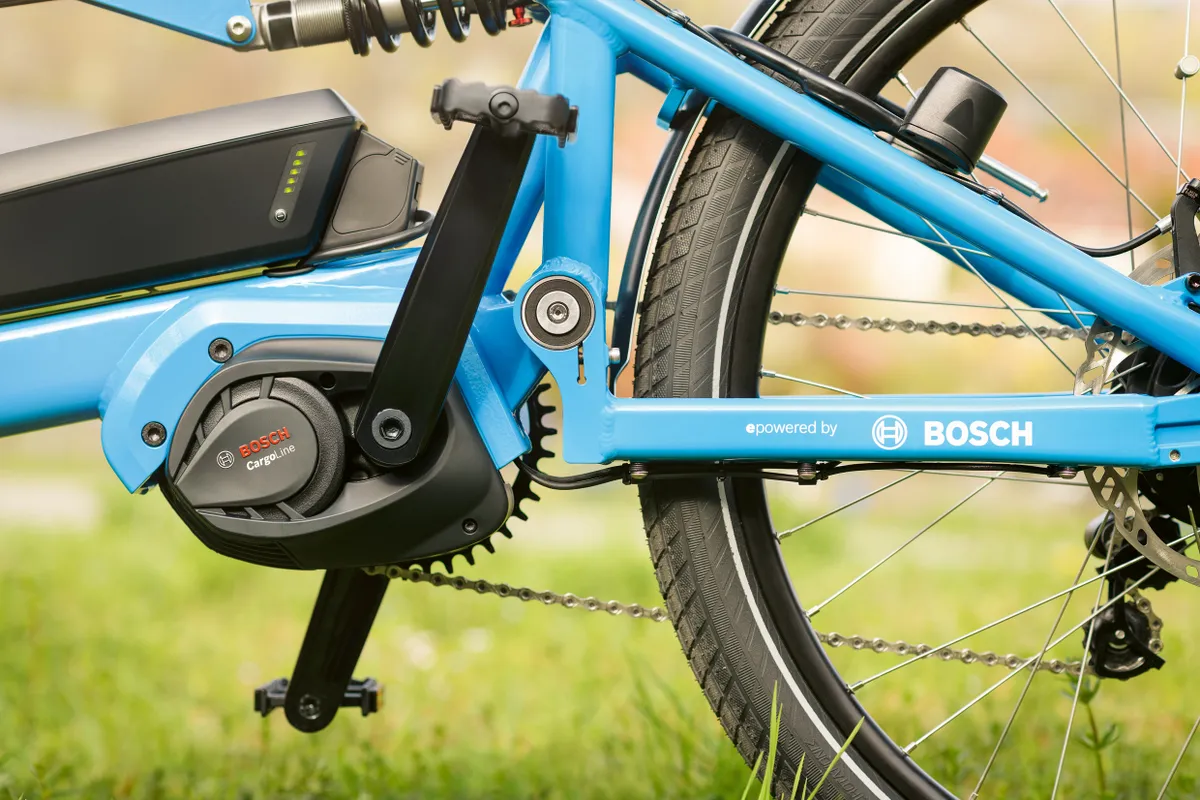
Bosch’s Cargo Line motors give 85Nm torque and 250 watts of assistance, and can provide up to 400 per cent of the rider’s power output. They also provide walk assist and a hill hold function so your bike won’t roll back downhill if you stop. Bosch offers an anti-lock braking system for electric cargo bikes using its system.
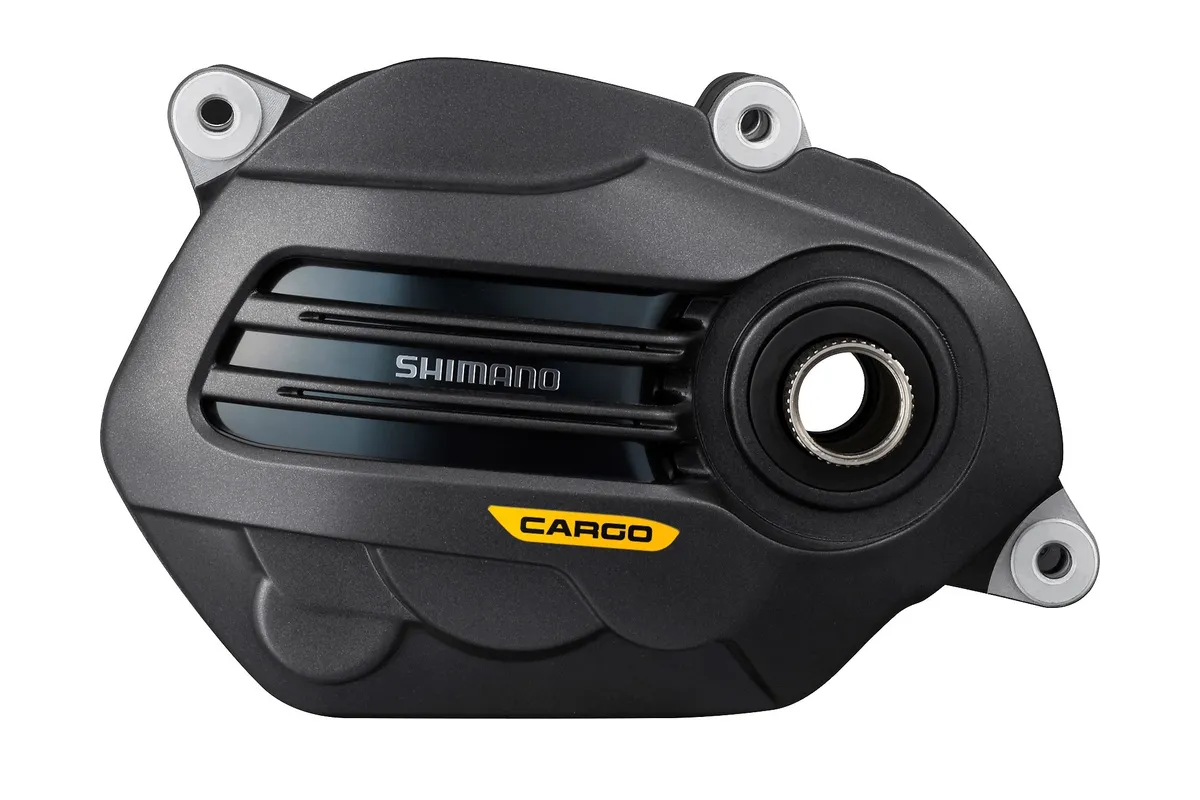
Shimano has a range of three Steps cargo bike motors with 250 watts power output, either with 85Nm or 65Nm of torque. Like Bosch, it offers ABS.
Shimano also has automatic gear shifts as an option and free shift, where you can initiate a gear change when you’re not pedalling. Shimano’s drivetrain tech includes Linkglide, designed specifically to be more durable for electric bike use.
Other brands provide motors that are fitted to electric bikes, although they may not be specifically designed or tuned for high-load, low-speed cargo bike use.
In the EU, a separate class of electric cargo bikes can be powered by more powerful 1,000-watt motors and throttle operated rather than requiring pedal input to provide assistance.
Riders must hold a licence to operate them and, as electric bike law dictates for other ebikes, assistance is speed-limited at 25kph.
Which brands make electric cargo bikes?
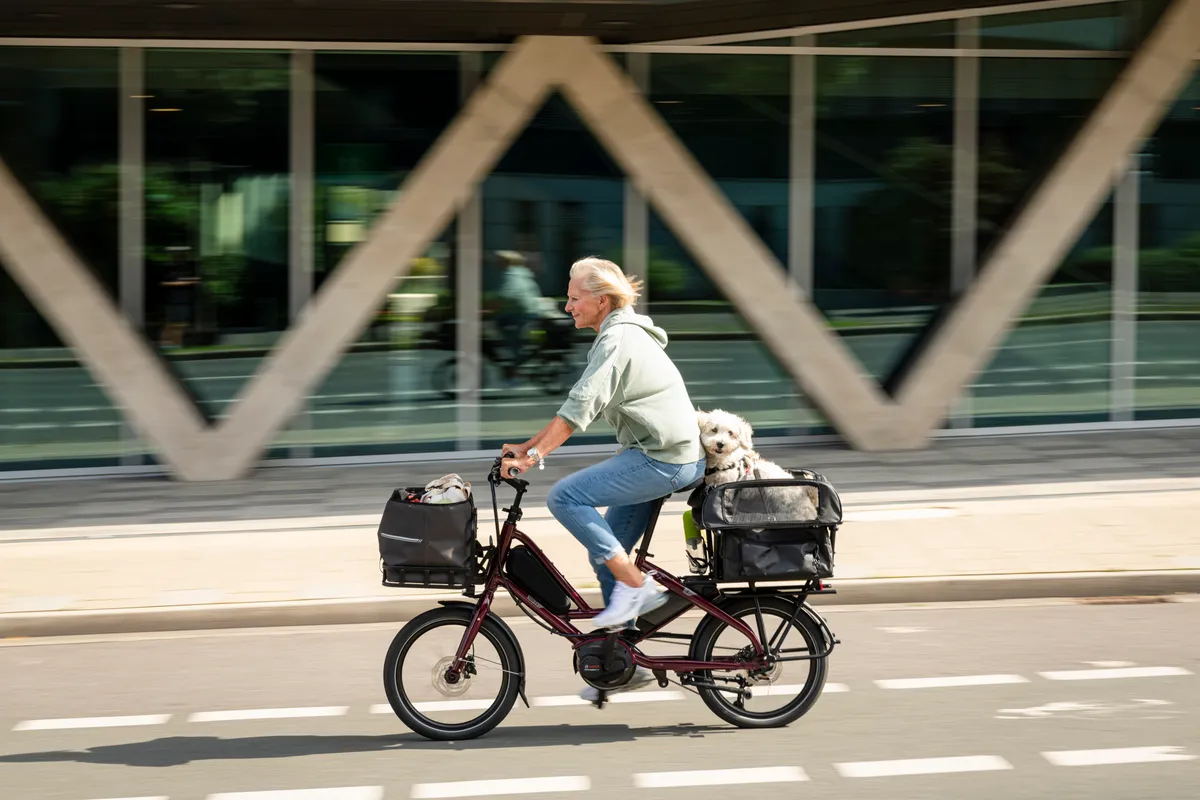
Electric cargo bikes are sold by quite a range of brands. Some are well-known, but others are smaller outfits that specialise in cargo bikes. Brands with an extensive range of electric cargo bikes include Riese & Müller from Germany, Tern from Taiwan and Surly in the US.
We’ve already mentioned Dutch brand Bakfiets, which makes exclusively electric and pedal-only cargo bikes.
Some big players see the potential in electric cargo bikes too; Raleigh and Cube sell a range of models and Specialized is about to launch its own electric cargo bikes.
Accessories
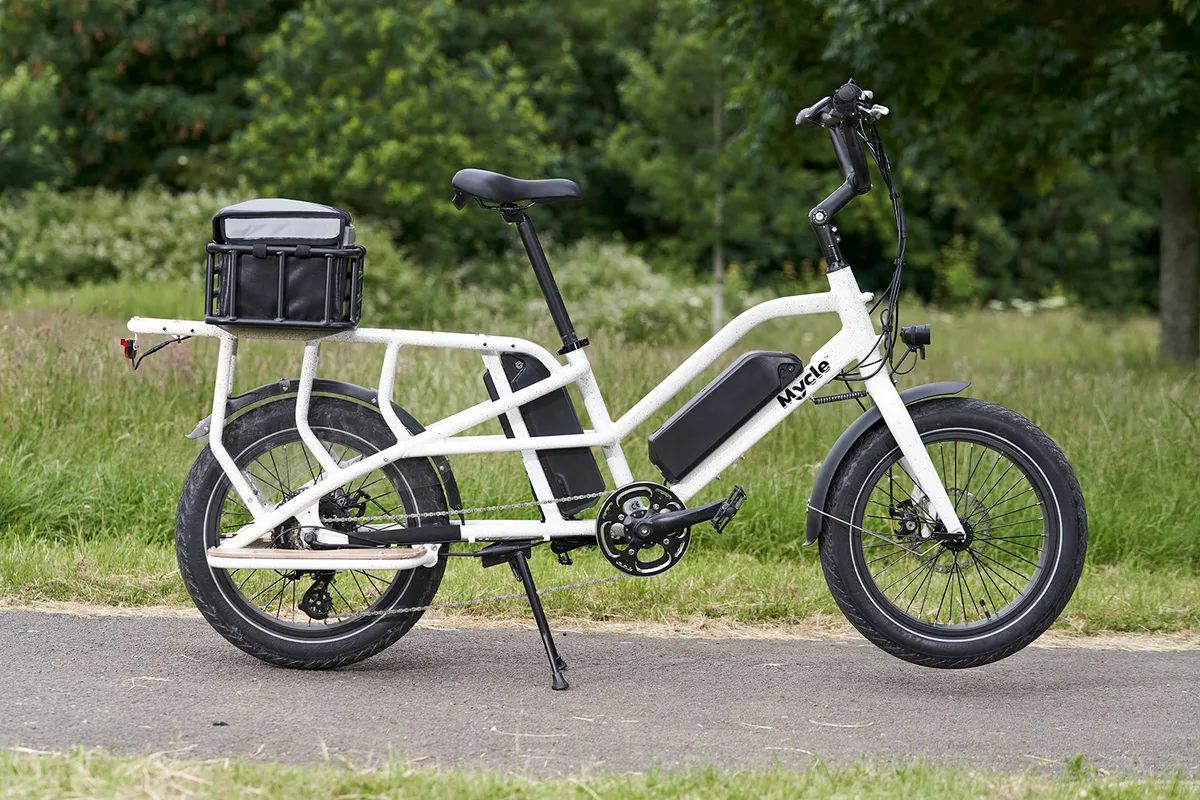
Many electric cargo bikes offer the ability to fit more than one battery to up the bike’s range.
Shimano, for example, has opened up its Steps electric motors so you can fit multiple batteries, including high-capacity options from third-party battery makers.
That opens up very high battery capacity options of up to 3,000Wh from four batteries, to give the range for intensive day-long use.
Often, there’s a variety of accessories sold by the cargo ebike’s maker. If the bike doesn’t come ready-equipped to carry cargo, the brand may sell purpose-made boxes or open baskets.
You may be able to buy seats for transporting children or adults, rain covers and lockable tops. Some electric cargo bikes have been designed to accept standard accessories such as child seats. We mentioned fitting a bike trailer above.
Many electric cargo bikes come ready-fitted with other useful accessories such as a kickstand, which needs to be extra-robust to handle the weight of the bike and its load. Often, you’ll get lights too, which may be powered by the motor’s battery.
What else to consider?
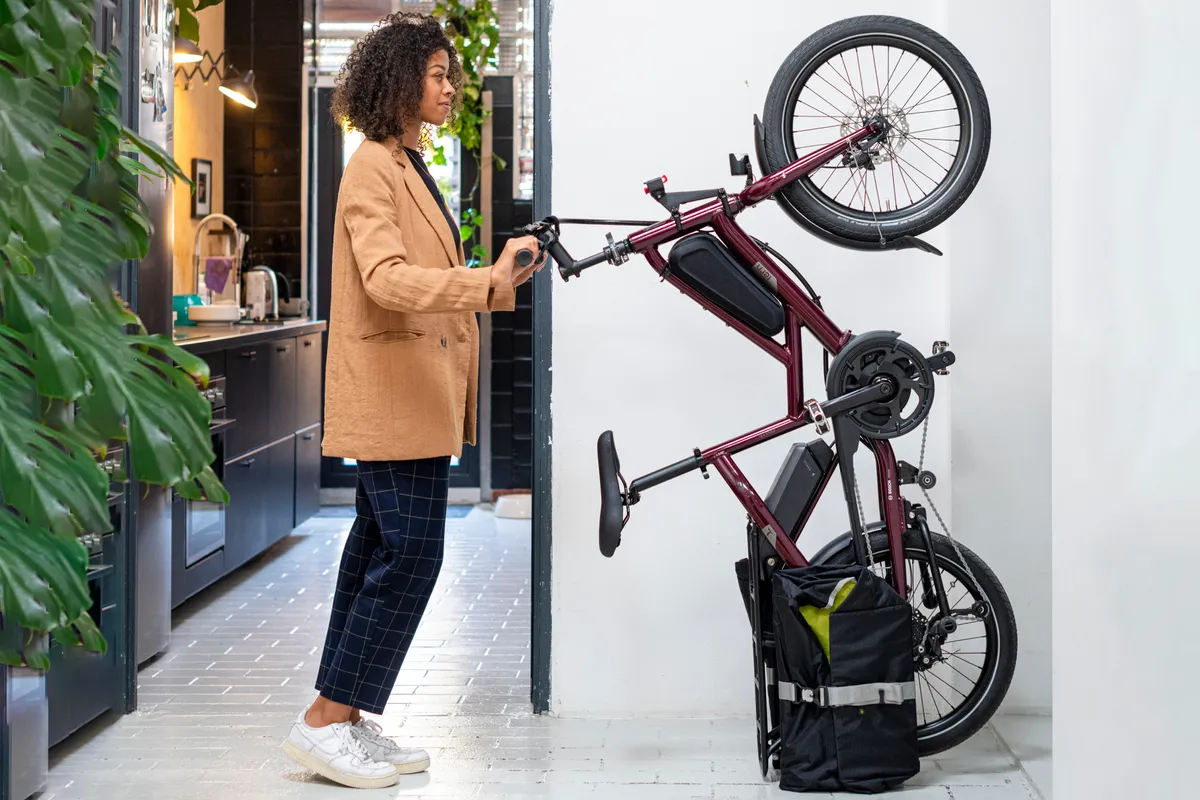
The main issue with an electric cargo bike is where to store it. Most are substantially larger than a standard bike, so you need extra room, particularly if you have boxes attached for load-lugging.
The Tern Quick Haul is designed so you can stand it on its rear rack when not in use, but you may need a dedicated storage area such as a garage to store an electric cargo bike.
Where you store the bike needs to be on the flat too – you’re not going to want to lug a 30kg electric bike up stairs. Walk mode can make off-bike manoeuvring easier.
You may also need an electric power output close to where you keep your electric bike. Many electric bikes have removable batteries, so you can take them indoors to charge, but some may not. It may be more convenient anyway to charge the battery in situ.
Charge times can be several hours, so if your bike is used intensively, you may need spare batteries to keep the motor running. Electric bike batteries are usually quite expensive, so spares will add significantly to the purchase cost.
